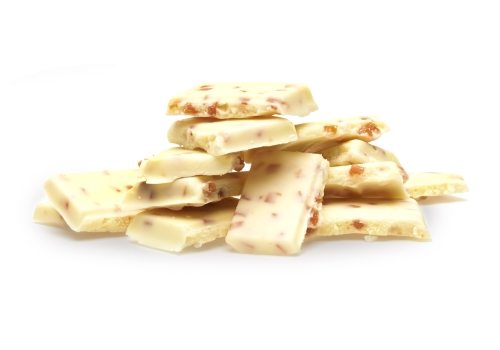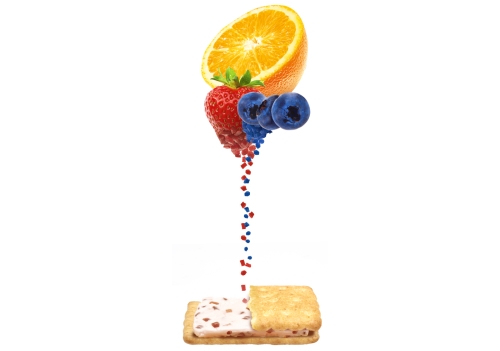Taura Natural Ingredients has on July 30, 2014, introduced Mini’s, which the company says they are possibly the world’s smallest real fruit pieces that are created for the Asia-Pacific market.
As tiny as a grain of quinoa, Mini’s is a range of extremely small real fruit pieces developed to enable food manufacturers to add the benefits of real fruit to applications where it has not before been possible.
It says demand is increasing across Asia-Pacific markets for very small real fruit pieces that are suitable for use in fine bakery and confectionery applications such as ultra-thin biscuits and premium thin chocolate tablets.
This increased demand can be attributed to health-conscious consumers seeking out indulgent products with fewer calories so they can enjoy snacking on treats without the guilt.
Mini’s are also expected to be popular as toppings on donuts and muffins and as inclusions in fruit and nut mixes.
They can be used as a fresh addition to frozen dairy beverages and desserts, and in popcorn products.
Their high fruit content means they are bursting with flavor, aroma, color and a have a soft, chewy texture – a set of benefits Taura Natural Ingredients has dubbed ‘F.A.C.T.’
Food News International finds out the market opportunities for Mini’s from Bartolo Zame, head of sales Asia Pacific.
FNI: Could you share why Mini’s are created for the Asia-Pacific market?
Zame: New food products need to present the idea of ‘feel the benefit’, which is based on our experience with selling partners.
This is especially so for consumers in Asia Pacific.
We have learnt that they really need to taste, smell, see and feel the inclusion.
Mini’s offer real fruit, through their flavor, aroma, color and texture, to products where it was not possible previously.
FNI: Why is there a growing demand for fine bakery and confectionery products?
Zame: We are finding that consumers are connecting with the combination of indulgence and an element of health.
This is especially so with thin or compressed styles of cookies and crackers, where the consumer is avoiding the guilt factor and continuing to enjoy the experience along the way.
This style of light, wafer thin product is easy to snack on and tastes great.
FNI: Which countries in Asia Pacific are showing opportunities for these products?
Zame: Snacking has become a huge part of the culture across Asia and consumers there are also becoming very conscious of what they are consuming with regards to health.
These types of products fit right into the power band for growth as they touch on health, convenience, indulgence and also have the ability to transcend occasions.
This means that these products can be consumed from early in the morning to late in the evening.
FNI: In your view, where would Asia-Pacific’s bakery and confectionery sectors be in the next five years?
Zame: The same key elements continue to come up in the sectors such as health, convenience and indulgence or ‘high end’.
The brands that will thrive over the next five years in the Asia-Pacific region will hold these key elements in mind and innovation will be in their core.
FNI: How will fruit pieces play a part in these sectors in the next five years?
Zame: Taura will continue to research and draw on our global reach to be aware of any shifts or movements in the market.
Just as we have with the introduction of Mini’s and the trend toward thin and light snacks.
With our large investment in research and development we have a huge amount of innovation on the shelf ready to go and with our relative company size, we are nimble enough to be able to move quickly to commercialize products when need be.
So I guess it is more about being in a position to change and move quickly with the rapid pace of the Asia-Pacific region, rather that fitting a current product to what we think may change.
FNI: What are your views on the real versus synthetic fruit use in products for consumers today?
Zame: It is about integrity and being able to stand behind your product.
Consumers are parting with their money to buy products that they believe has real fruit in them and to that end they should contain real fruit.
This is the exciting part about our Mini’s launch, as it is enabling food manufacturers to include real fruit to be in food products where previously it has not been possible.
FNI: In the health and wellness sector, there seems to be mixed views about fruit as healthy-for-you ingredients, yet potentially a weight-loss barrier due to (high) sugar content. Could you share your views on this?
Zame: We provide innovation to the food industry through incorporating fruit in products that previously have not been possible.
Through factors such as functionality, clean labelling and taste, we continue to offer alternatives to the food industry from ingredients such as chocolate chips, with their fat content, and dried fruit and their inherent presence of sulphites.
This is how fruit can play into the health and wellness space, which provides a healthier alternative, coupled with innovation, to an industry that is demanding for such options.
In addition, portion size will always trump other factors when it comes to weight loss, and I guess this is why we are seeing such a growth in demand for light, thin compressed style products.












